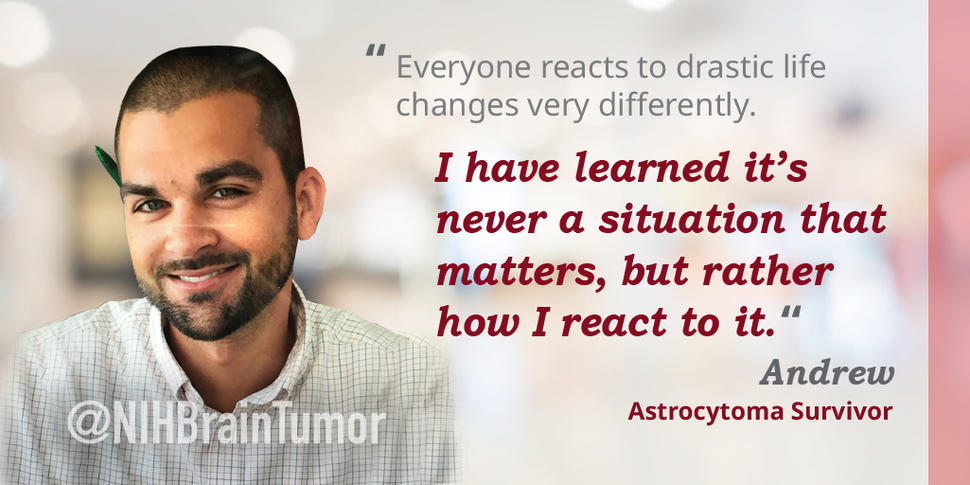Brain and Spine Tumor Survivors Share How to Cope
, by Kristin Odom, NCI-CONNECT Communications Editor
Brain and spine tumor treatment can cause a variety of symptoms that impact the way you feel and function. With a brain tumor, you can experience pain, difficulty communicating, cognitive issues, and seizures. Spinal cord tumors can cause pain, numbness, and weakness. These can be hard to cope with or adjust to.
Patients share their advice to help guide you through your brain or spine tumor journey. Use their words and the resources listed below to help you manage in a positive way.
Seek Physical Therapy and Counseling
“My tumors and treatments have affected nearly every part of me. I need the support of my family and friends more than ever. I also benefit from the counsel of a therapist, who provides an objective ear and often has great tips to help navigate this rocky, unwanted life with cancer.” – Carol, ependymoma survivor
“I initially underestimated the importance of maintaining and nurturing my mental health—and how much a diagnosis of this type would affect my sense of well-being. Seeing a psychologist has helped a lot with life changes post-treatment and the uncertainty.” – Anonymous, Outcomes and Risk Study participant
“Following surgery, I went to physical therapy to gain more independence. I had to learn how to get out of bed properly, get dressed, pick up heavy things, and strengthen my core. How quickly and how well you recover all depends on you, your health history, and your support system at home.” – Lee, spinal cord tumor survivor
Resource: NCI guide on mental health >
Accept Support from Others
“I do not have the same energy level when I am on chemotherapy. I sleep a lot, sometimes 12 to 15 hours a day. I could not imagine working full-time. I am thankful that my parents live in the same city. They take me to the doctor, take my kids out because I can’t, and bring over food.” – Giselle, ependymoma survivor
“The most difficult part of my proton radiation treatment was being away from home for two months. I often felt isolated. I video chatted on FaceTime with my daughters every night, and we read stories together, which was very helpful. They also sent me lots of funny pictures to make me smile.” – Andrea, ependymoma survivor
“After I recovered from surgery, I wanted to know more about my illness and explore resources and advice from others, so I searched online for support. After connecting with others, I have realized miracles happen. A miracle happened for me.” – Marcela, ependymoma survivor
Resource: NCI guide on relationships and communication with others >
Use Wellness Activities to Manage Symptoms and Stress
“When I was diagnosed, I was fortunate to be in the best physical shape I could be. I was running half marathons, and I think that was important to help with recovery from surgery and the side effects of my treatments.” – Ken, medulloblastoma survivor
“Movement and activity are essential, but more is not always better.” – Anonymous, Outcomes and Risk Study participant
“Cancer forced to me to focus on my well-being and be better about nutrition. Mindfulness and other complementary techniques like massage and acupuncture have also really helped me release stress and make my body feel better.” – Bob, glioblastoma survivor
“I started to have mild, chronic back pain, which expanded to my leg and left buttock. I couldn’t sleep. Getting out of bed was nearly impossible. Yoga helped me deal with the pain.” – Marcela, ependymoma survivor
Resource: NCI guide on managing your symptoms >
Seek Answers to Your Questions
“It's normal to feel helpless when you are first diagnosed with a serious illness, but this just highlights the importance of finding the right medical team for guidance. Finding the right experts and resources allowed me to feel positive, and I now have the strength to fight the battles ahead.” – Beth, ependymoma survivor
“Ask a lot of questions. Do your own research and be a knowledgeable patient. You're in a partnership with your physicians and care team.” – Anonymous, Outcomes and Risk Study participant
“Side effects are different for each person. When treatment-related changes happen, acknowledge your side effects, ask questions, and adjust. No one expects you to go through treatment and act like it doesn’t affect you. Once treatment is over, your body quickly adjusts to its normal self.” – Nick, ependymoma survivor
“Try your best to get educated and to advocate for yourself. Get connected with an organization that can help you navigate the medical world and inform you of all of your options.” – Anonymous, Outcomes and Risk Study participant
Resource: NCI guide on patient and caregiver support organizations >
Stay Positive and Accept Yourself
“I didn’t have control over my disease or the situations around me, which changed every day. But I now know that how I feel today doesn’t have to dictate how I feel tomorrow, in a week, in a month, or even in a year from now.” – Andrew, astrocytoma survivor
“Life will change—in some ways for the better. It gets easier to deal with the physical limitations over time, but recovery can be slow. Dig deep and stay strong. Life is worth it.” – Anonymous, Outcomes and Risk Study participant
“Although it might be a scary experience at the moment, do not give up hope. Keep your head up, try to make the best out of each day. Do not forget that there is light at the end of the tunnel. You will get through it.” – Anonymous, Outcomes and Risk Study participant
“Expect a new normal, ask for help when needed, and be gentle with yourself when you aren't physically or mentally the same as before.” – Anonymous, Outcomes and Risk Study participant
Resource: NCI guide on managing your emotions and feelings >
Join our private Facebook group or follow us on X (formerly Twitter) to hear more messages from our community.
